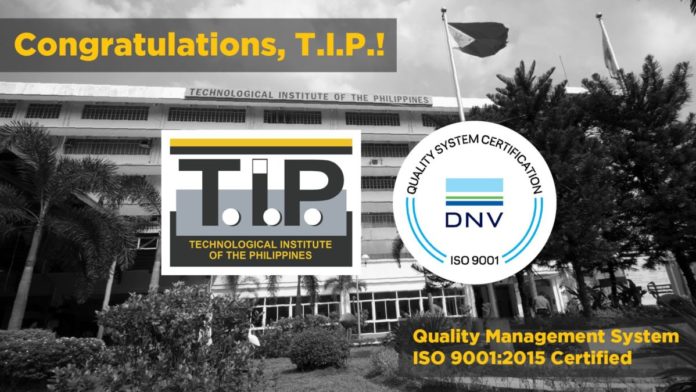The Technological Institute of the Philippines (T.I.P.) last March 2-4, 2021, completed the ISO 9001:2015 recertification process for its Quality Management System (QMS). International quality assurance company Det Norske Veritas (DNV) conducted the recertification process virtually through their audit team headed by Marita Bayon.
With this successful audit, T.I.P. ‘s quality management system has been certified compliant to the ISO 9001 standard since 1999 or 22 consecutive years as of writing.
“This successful ISO 9001:2015 audit is proof that the T.I.P. QMS remains at par with those of the world’s best educational institutions. Our school processes have been found to be repeatable and consistent, leading to quality at all levels of operation. Moreover, we have been consistently enhancing T.I.P.‘s services through continuous improvement projects and initiatives, with insights derived from surveys and focus group discussions with relevant stakeholders,” said T.I.P. president Dr. Elizabeth Quirino-Lahoz.
As a formal part of the T.I.P. quality management system certification maintenance, the audit aimed to determine T.I.P.’s continuing compliance with the ISO 9001:2015 standard for the provision of tertiary education. It also gauged the effectiveness of the T.I.P. QMS in helping achieve specified organizational objectives, as well as meeting applicable statutory, regulatory, and contractual requirements. Overall, the DNV auditors found a myriad of positive observations and no non-conformities to meet ISO requirements.
The 2021 recertification of the T.I.P. quality management system involved four focus areas. The first, activities to retain enrolled students, saw DNV positively citing various related T.I.P. efforts. These include the availability of student-friendly payment terms, scholarship grants, and a supplementary financial aid program for students. Student services, including the T.I.P. Student Well-Being Program for physical, mental, and academic well-being; USAID-awarded T.I.P. Virtual Career Center; and the strict implementation of health protocols for in-campus transactions were also noted as remarkable efforts.
The second focus area was activities to retain performing and qualified teachers. T.I.P.’s efforts to ensure the professional development and well-being of its teaching and non-teaching employees were also positively observed. Moreover, it was noted that T.I.P. was able to undertake numerous research projects and grants. During this pandemic, T.I.P. was able to secure nine (9) grants from the Department of Science and Technology and its various industry partners.
The third focus area involved the effectiveness of student competence measurement. Cited as positive indicators of T.I.P.’s high degree of control over this area were the ABET accreditation of T.I.P.’s 20 engineering and computing programs by the Engineering Accreditation Commission (EAC) and the Computing Accreditation Commission (CAC), as well as the school’s use of the Canvas Learning Management System (LMS). ABET programmatic accreditation entails the existence of a comprehensive outcomes-based assessment system for students, while Canvas features built-in analytics for real-time student assessment. Both these measures enable T.I.P. to manage student competencies over the short- and long term.
The fourth focus area looked into the effectiveness of the school’s new development processes. T.I.P.’s smooth transition into online learning was positively cited for this area, specifically the intermittent use of, and extensive training with, the T.I.P. Canvas LMS pre-pandemic. Additional positive observations were made regarding the school’s IT-related aspects, including system quality, IT quality plan, IT staff, and online library.
Lastly, the DNV also noted T.I.P.’s overall commitment to the continuous improvement of its quality management system. T.I.P.’s management continuously endeavors to conduct benchmarking at the local and international arenas; adheres to operational and quality plans; regularly engages stakeholders; undertakes new normal readiness projects; and obtains international accreditations, among others.
“The ISO certification ensures that T.I.P.’s stakeholders experience consistently high standards of service from the entire institution. It is a mark of quality in everything T.I.P. does, allowing T.I.P. to realize its foundational objective of providing high-quality tertiary education within reach of most Filipinos,” concluded Dr. Lahoz.
For more information on T.I.P., please visit tip.edu.ph or T.I.P.’s official social media accounts through @TIP1962official for Facebook, Twitter, and Instagram.
